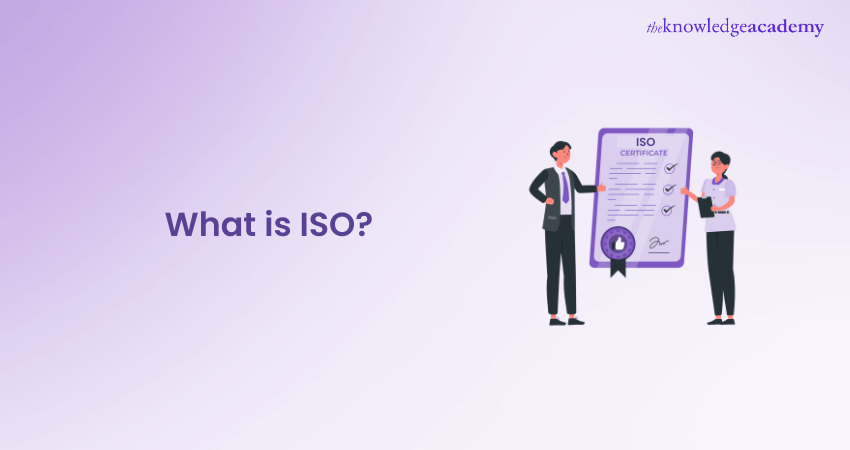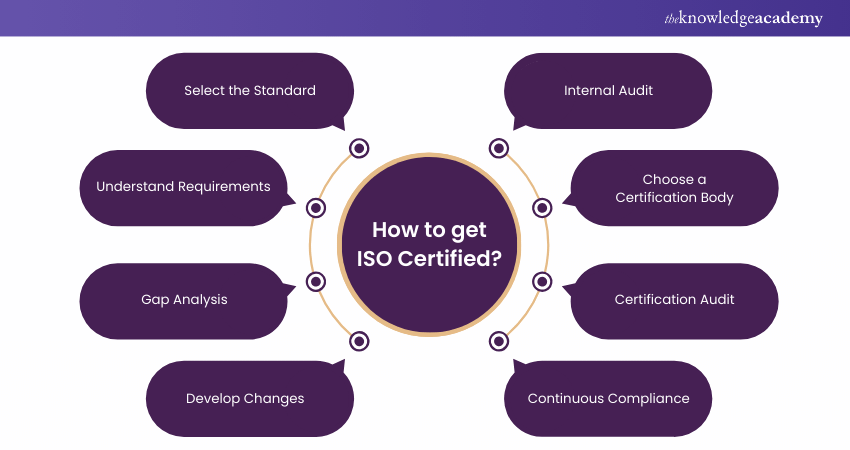We may not have the course you’re looking for. If you enquire or give us a call on +44 1344 203999 and speak to our training experts, we may still be able to help with your training requirements.
We ensure quality, budget-alignment, and timely delivery by our expert instructors.

Imagine building a world where every piece of technology, every product, and every service works seamlessly together, regardless of where it's from or who made it. This is the vision behind ISO, the International Organization for Standardization. But What is ISO, and why is it so crucial in our daily lives?
From ensuring the quality of your morning coffee to the safety of the car you drive, ISO Standards touch nearly every aspect of modern life. ISO represents a global network of best practices that help industries innovate, improve efficiency, and meet customer expectations. Let's explore What is ISO and how its standards shape our world.
Table of Contents
1) What is ISO?
2) ISO Standard Types
3) How are ISO Standards Developed?
4) ISO Standards Benefits
5) Why do Businesses Need ISO Certification?
6) How to Manage ISO Standard Compliance
7) How can ISO Have a Positive Impact?
8) How to get ISO Certified?
9) Conclusion
What is ISO?
ISO is a non-governmental organisation committed to developing and publishing standards worldwide. Established in 1947, ISO promotes cross-border business. It also provides support to new product and service developments with the with the aim of improving companies' efficiency and quality.
An organisation that takes the memberships from more than one hundred and sixty countries has drafted thousands of standards. The general standards cover almost every industry, from food safety to technology. ISO work engaging technical specifications will be based globally for consumers and business to access them conveniently and safely.
ISO Standard Types
The ISO Standards are split up into different types of standards to examine various aspects of the quality, safety, and efficiency of industries in-depth. The main types include:
a) Quality Management Standards such as ISO 9001 focus on processing improvement and customer satisfaction enhancement.
b) Environmental Management Standards, like ISO 14001, are designed to help organisations manage sustainably. They aim to decrease the negative impact of business operations on the environment.
c) Occupational Health and Safety Management Systems, like ISO 45001, set the global standard for workplace safety. They ensure the health and safety of workers through structured management practices.
d) Information Security Standards, especially ISO 27001, provide a uniform set of best practices for managing Information Security. These standards build trust between consumers by ensuring robust data protection and compliance in international trade.
How are ISO Standards Developed?
The organisation conducts a systematic process by bringing together experts from a wide range of industrial and regional countries. Key stages in the development of ISO Standards include stages such as:
a) Proposal Stage: Industry organisations, consumer associations, governments, and other stakeholders may suggest new regulations. A proponent of a standard sets out what the standard is to address and for what supposed purpose.
b) Preparatory Stage: When the project has been officially authorised, a specialist team is designated. This working group prepares the outline of the first standard text. Members from the expert group will be nominated from all countries in agreement with all concerned stakeholders, including consumers, businesses and government.
c) Committee Stage: The draft standard is presented and tested by a group of specialists who approve and renew the document. Committee members move amendments, edit whatever is needed and then cast the votes in support or against the document. Numerous consultations and refinements have to be made in order to appease everybody.
d) Enquiry Stage: All ISO member bodies conduct voting on the proposed standard and provide comments as well. It may get the prescribed percentage of affirmative votes or may be accompanied by negative affirmative votes in order to proceed.
e) Approval Stage: The successful accomplishment of this stage of enquiry will result in the passage to the final approval stage, which involves a final vote by the ISO national bodies.
Another crucial step includes the revision of ISO Standards to ensure they remain relevant and accurate. Benefits of ISO 27701 come into play as these standards undergo review every five years, reflecting current technological advancements and social trends. Based on the evaluation, a standard may be confirmed, revised, or withdrawn.
If revisions are needed, the standard undergoes a detailed update. This process involves stakeholder consultations and expert discussions before an updated version is published. A standard is withdrawn only if it is outdated and no longer useful, but it is not automatically replaced by a new one. This process ensures that ISO Standards facilitate continuous improvement and adaptation to new challenges in their respective fields.
Join our Integrated Management System Training to streamline your compliance and boost organisational efficiency!
ISO Standards Benefits
a) Better Efficiency and Improved Quality: ISO Standards allow organisations to make their operations more streamlined for better efficiency and quality in delivering their products and services.
b) Greater Customer Satisfaction: The standards verify the quality and reliability of the product, thereby increasing customers' trust.
c) Market Access: Compliance with ISO Standards allows an organisation to easily enter foreign markets, as most countries require or prefer that the requirements be adhered to.
d) Risk Management: ISO Standards detail a framework for operations and business settings, from identifying to managing and reducing risk.
e) Environmental impact: Many of the ISO Standards allow companies to implement Environmental Management in an effort to reduce their environmental footprint and meet regulatory requirements.
Why do Businesses Need ISO Certification?
Organisations that aim to establish best business practices, win more contracts, and achieve better control often turn to the ISO 9001 standard. Numerous studies have shown that implementing ISO 9001 leads to superior performance, with certified companies consistently outperforming their competitors. Some of the benefits of adopting this standard include the following:
1) Enhancing client confidence in your business, services, and products
2) Winning more tenders and gaining additional business opportunities
3) Increasing operational performance
4) Facilitating better communication and coordination within the organisation
5) Streamlining the induction process for new staff
6) Ensuring consistent service and product delivery
7) Boosting employee morale and motivation
8) Supporting future business growth
How to Manage ISO Standard Compliance?
Managing ISO Standard compliance involves several key steps:
a) Be familiar with the targeted ISO Standard that is applicable to your organisation and make a detailed assessment of current processes in your organisation with respect to these standards.
b) Make necessary changes to bring in conformity with the standard, and train employees and processes accordingly.
c) Audit internal practice on a regular basis for compliance and further improvement.
d) Engage certified external auditors to validate the claimed practice through a certification process.
e) Finally, commit to continuous improvement by being sensitive to any changes in the standard and constantly revising processes based on audit feedback.
Sign up today for Certified Internal Auditor Training to enhance your auditing skills and advance your career!
How can ISO Have a Positive Impact?
The ISO Standards provide a positive impact on the industry. They help unify processing rules, improve product and service quality, and so increase safety and efficiency. They are doing this by streamlining international trade. They guarantee that new and existing products and services are compatible at the global level.
Using ISO Standards offers organisations a way to mitigate risks and improve their performance. They also help increase customer satisfaction by fulfilling customers' expectations. Referring to the ISO 21001 guide can provide deeper insights into how these standards enhance organisational efficiency and customer trust.
The environmental ISO Standards also boost sustainability. They do this by holding reduction of any negative influence on the environment. They also enhance resource use efficiency and improve waste management. A resonating effect of that influence builds trust not only among consumers and businesses. It also builds trust among governmental regulating institutions at the global level.
How to get ISO Certified?
Follow the following steps to obtain your ISO Certification:

a) Select the Standard: Determine which ISO Standard applies to your organisation. It might be ISO 9001 for Quality Management or ISO 14001 for Environmental Management.
b) Understand Requirements: Study the chosen standard to understand what it entails.
c) Gap Analysis: Conduct a gap analysis to identify those aspects that need to be done within your organisation to bring it to the standard.
d) Develop Changes: Develop a change plan and implement a plan to get the organisation's processes in line with the ISO requirements. This can involve training staff, updating processes, and making changes to documentation.
e) Internal Audit: Conduct an internal audit to ensure all parts of your organisation meet the ISO Standard.
f) Choose a Certification Body: Select a certification body that is ISO-accredited to conduct the audit of your organisation.
g) Certification Audit: Your selected body will carry out an audit on your processes; if you meet the criteria, then they will issue an ISO certificate.
h) Continuous Compliance: Keep compliant through ongoing internal audits and re-certification audits, if necessary, to meet the standard.
Innovate effectively—download the ISO 56002 Innovation Management System PDF now!
Conclusion
In conclusion, ISO plays a vital role in shaping a world of trust and quality. From ensuring product safety to streamlining processes, its impact is undeniable. Integrated Management System for ISO 45001, 9001, and 14001 further enhances this by combining key standards for efficiency and compliance. This blog just scratched the surface of what ISO is. Keep reading to explore the different ISO Standards, their benefits, and how they impact your everyday life!
Boost your professional credentials and safeguard your career - register for our ISO Certification today!
Frequently Asked Questions
What are the Limitations of ISO?

ISO Standards can be costly to implement and maintain, especially for small businesses. The certification process can be time-consuming and requires ongoing audits. ISO Standards might also lead to excessive documentation, and the focus on compliance can stifle innovation.
Who Certifies ISO?

ISO Certifications are granted by external certification bodies accredited by national or regional accreditation organisations. These certifying bodies assess organisations to ensure they meet ISO Standards and conduct regular audits to maintain certification compliance.
What are the Other Resources and Offers Provided by The Knowledge Academy?

The Knowledge Academy takes global learning to new heights, offering over 3,000 online courses across 490+ locations in 190+ countries. This expansive reach ensures accessibility and convenience for learners worldwide.
Alongside our diverse Online Course Catalogue, encompassing 19 major categories, we go the extra mile by providing a plethora of free educational Online Resources like News updates, Blogs, videos, webinars, and interview questions. Tailoring learning experiences further, professionals can maximise value with customisable Course Bundles of TKA.
What is the Knowledge Pass, and how does it work?

The Knowledge Academy’s Knowledge Pass, a prepaid voucher, adds another layer of flexibility, allowing course bookings over a 12-month period. Join us on a journey where education knows no bounds.
What are Related Courses and Blogs Provided by The Knowledge Academy?

The Knowledge Academy offers various ISO Certification, including the Certified Internal Auditor Training and Integrated Management System Training. These courses cater to different skill levels, providing comprehensive insights into ISO 9001 Auditor.
Our ISO and Compliance Blogs cover a range of topics related to ISO, offering valuable resources, best practices, and industry insights. Whether you are a beginner or looking to advance your ISO Compliance skills, The Knowledge Academy's diverse courses and informative blogs have got you covered.
Upcoming ISO & Compliance Resources Batches & Dates
Date
 Integrated Management System Training
Integrated Management System Training
Fri 6th Jun 2025
Fri 29th Aug 2025
Fri 24th Oct 2025
Fri 26th Dec 2025
Fri 27th Feb 2026
Fri 1st May 2026
Fri 28th Aug 2026
Fri 11th Dec 2026






 Top Rated Course
Top Rated Course



 If you wish to make any changes to your course, please
If you wish to make any changes to your course, please


